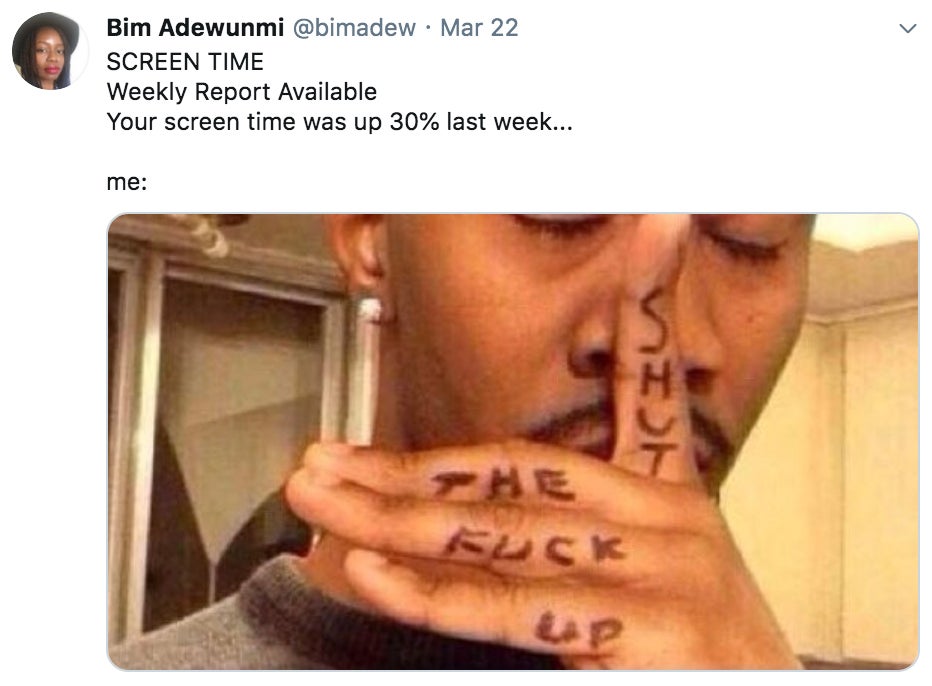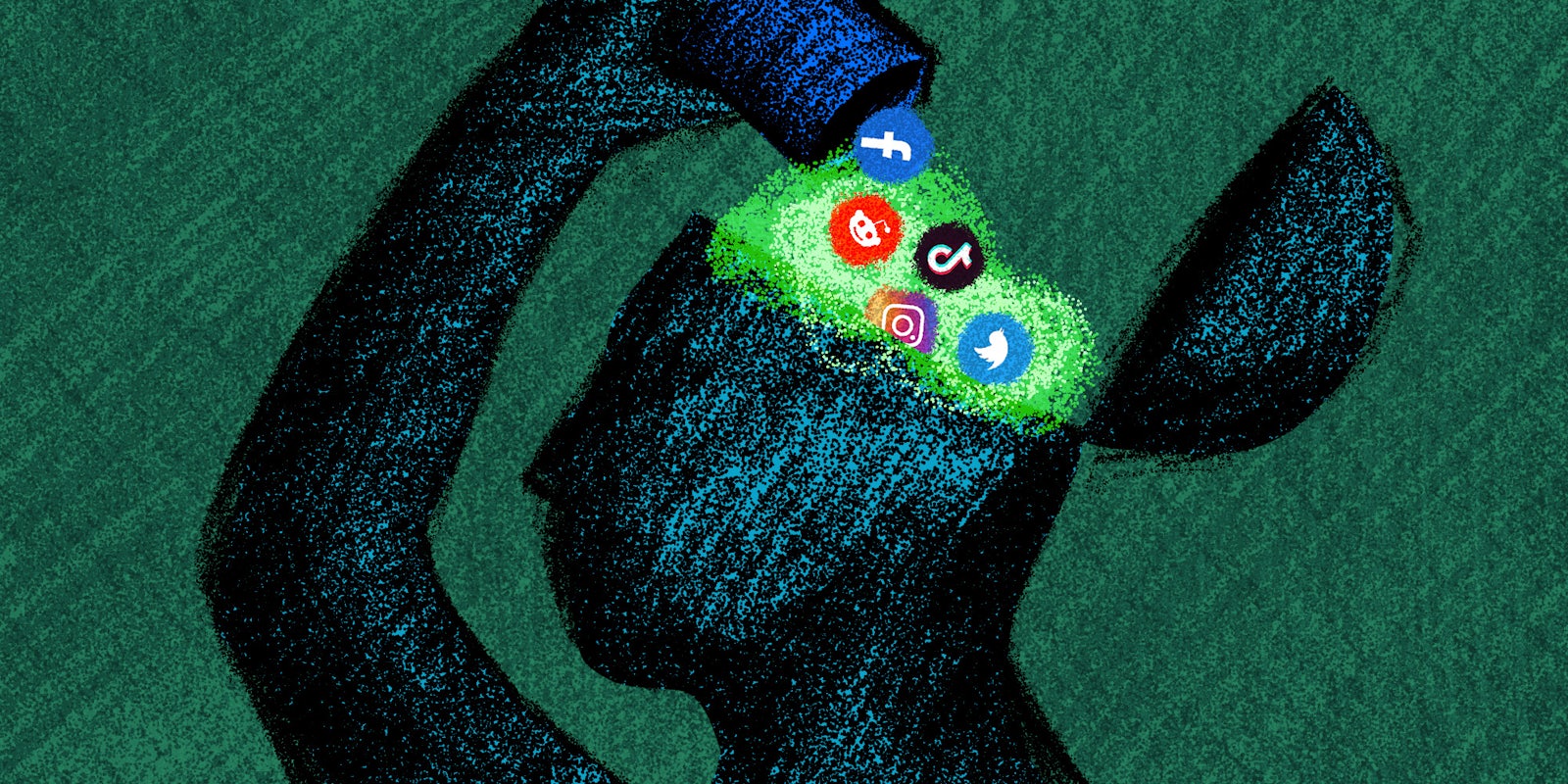Adalyin Alvarez is adjusting to a new normal.
Alvarez, an English and chemistry third-year at the University of Texas at Austin, now takes classes online, and she has moved back in with her parents in South Texas. The university, like many college campuses, shut down on March 13 to mitigate the spread of COVID-19.
Alvarez spends up to five hours at a time online doing schoolwork, working part-time as a course assistant, staying in touch with friends and family, keeping up with breaking news, and getting bites of entertainment on apps like TikTok.
However, despite finding a “groove” in her new routine, her reliance on tech throughout the pandemic has taken a hit to her mental health, she said.
“I was struggling the first few weeks,” Alvarez told the Daily Dot. “As someone that has mental health problems, like depression and anxiety, I do like being alone, but the idea of being forced to stay inside is depressing.”
Stay-at-home orders, shelter-in-place restrictions, and business closures across the nation have caused an uptick in online traffic and technology use. The New York Times reports social media companies have seen their websites see greater traffic, and reliance on video chat services that help to facilitate learning and work environments, such as Zoom and Google Classroom, have risen as well.
“What I hear anecdotally from people and students [is] they just feel exhausted,” said Jennifer Kruger, a clinical professor at the University of Buffalo who researches consumption and addictive behaviors. “They have a flurry of emotions and might be sleeping more and are not used to not having this routine. That kind of dramatic shift and constantly being bombarded with not so pleasant news [is] really challenging to digest.”
With this growing trend of dependency, a difficulty has emerged: The burden that dependency on technology can leave on one’s mental health. For many people, face-to-face meetings to complete work or catch up have evaporated. They’re left to find alternative methods of connection that don’t carry the same weight, or emotional responses, that come with physical contact. And technology’s purpose now goes beyond convenience and entertainment; it’s an essential tool to complete everything from the essential to the mundane.
‘A lifeline to the outer world’
For some, COVID-19 and the response surrounding the disease has amplified anxiety.
About 45% of adults “feel that worry and stress related to coronavirus has had a negative impact on their mental health,” according to a March poll from the Kaiser Family Foundation.
Stacey Ryan, a psychiatric nurse practitioner based in New York who’s been using telehealth to see her clients, said she fears the repercussions the virus will have on her and other healthcare workers’ mental health.
“Even with the [telepsychiatry] all day, I’m getting to the end of the day, and my neck hurts, I have a headache,” Ryan told the Daily Dot. “It’s so much just sitting with technology. So it’s hard to balance it out physically and mentally.”
While taking online courses, Alvarez has also dealt with headaches and strains on her eyes.
“I was not doing too well those first two weeks,” she said. “Online learning made this whole semester feel like it was optional.”
Ryan said she’s noticed herself being more drawn to her devices outside of work to stay up to date on the news and check social media.
“I know that my screen time has gone up exponentially,” Ryan said. “But some of it feels like a positive thing, almost a lifeline to the outer world.”
For many people, the sign of the times means spending a considerable amount of time on their devices.



This month, Twitter reported monetizable daily active users on the site rose almost 20% since early 2019 and up 8% from late 2019. The site also saw a 30% increase in “direct message usage since March 6.”
Facebook reported last month that messaging across the platform “increased more than 50% over the last month” in some countries, along with an increase in voice and video calls on the Messenger app and WhatsApp.
Alvarez said she’s been dependent on video services like Zoom and Houseparty to connect with friends amid stay-at-home orders.
“You go to technology [because] you can’t really go hang out with friends,” Alvarez said. “Everything that I do in terms of entertainment relies on technology in some sense.”
People are also finding ways to socialize outside of their usual social media bubbles. The Netflix Party browser app allows users to chat with multiple friends while watching the same movie at once, and the meme-inspiring Animal Crossing: New Horizons arrived in March—just in time for coronavirus lockdowns.
There’s a possibility that the pros of using technology outweigh the cons. In a time where many feel the reigns of their lives have been overtaken by virus-related anxiety, technology offers control over how and when to connect and consume.
READ MORE:
- Are TikTok nurses helping or harming healthcare?
- For quarantined singles, coronavirus dating means FaceTime and chill
- This massive school district’s first day of distance learning fell apart amid racial slurs, porn
- Social media sites are ditching their content moderators at the worst possible time
The search for meaningful screen time
For Beth Bluck, a parenting blogger and Instagram influencer who’s based in the U.K., social media has been a place of solace.
She’s actively worked to limit what she’s exposed to online, Bluck said, while also working toward reaching out to others who may be struggling with their own mental health during this time. She and fellow parent blogger Rebecca George recently started a Facebook group that focuses on mental health support concerning COVID-19.
Recent posts on Bluck’s blog supply parents with advice on how to prioritize their mental health and tips on “staying patient” with children during social isolation.
“I suffer with anxiety and that’s one of the reasons why I started creating the articles and the group,” Bluck told the Daily Dot. “Helping others helps me to feel useful and in control of my own mental health issues. I think social media plays a huge part in keeping people connected and can have a really positive effect on mental health if you surround yourself with positive media.”
Approaching internet use “mindfully” instead of passively interacting with content can help, said Mesfin Bekalu, a research scientist at the Lee Kum Sheung Center for Health and Happiness within Harvard’s School of Public Health.
“If you just scroll through your Facebook or Twitter, just looking at profiles and pictures, I mean, that’s likely to be harmful compared to engaging in meaningful interaction with someone you know,” Bekalu told the Daily Dot.
“Even though I’m an introvert and a home-body, the isolation was starting to get to me.”
-Gabrielle Allard, creator of COVID-19 mental health Facebook group
If they cultivate a sense of camaraderie, even Facebook groups can cultivate meaningful interactions. Gabrielle Allard, a Colorado resident and compliance specialist, created a group similar to Bluck’s where users are welcome to discuss their mental health needs and concerns in response to COVID-19.
“Even though I’m an introvert and a home-body, the isolation was starting to get to me,” Allard told the Daily Dot. “I deal with depression and anxiety, and I noticed my symptoms were starting to get worse, exacerbated by not only the quarantine itself, but by the stress of what the future will hold for both myself and others affected by the virus.”
Although active internet use can help mitigate mental health concerns for some people, for others, such as college student Desiree Ortega, the simple act of interacting online can still be overwhelming.
“Having to stay home worsens my depression symptoms,” Ortega, a senior at the University of Texas at Austin, told the Daily Dot. “Sometimes, it doesn’t allow me to reach out to friends… Even if I’m active on these social media apps, I’m not so much active in terms of answering my messages or responding to friends.”
While some experts have advice on how to best approach internet use, other experts say normal standards have been thrown out of the window. Warnings to step away from screens have lost their strength. Now what’s most important is that individuals find what works best for them, said Shira Gabriel, an associate professor of psychology at University of Buffalo.
“Don’t feel guilty about all the time you’re spending on Instagram, Facebook or Twitter, (do) whatever it is that makes you happy and makes you feel connected,” Gabriel said. “[The] message I’ve been trying to send people at this time is stop feeling guilty about the things that we normally feel guilty about. This isn’t the time. Just let yourself do what you need to do to make yourself feel good.”
Moreover, pressure to be productive can clash with mental health, pushing people to search for coping mechanisms that bring them the peace they may crave.
Learning to log off
As people search for ways to fill up their day that doesn’t always involve work or getting on their devices, one option is tapping into self-reflection or journaling, said Amber Case, a researcher who studies the connections between humans and technology.
“Right now, it’s like everything’s been compressed and flattened,” Case said. “Where are you gonna blow off steam? You have to actually ask, what do you want for yourself?”
Bluck also said she’s intentional about including “screen-free activities” into her routine.
“I am a keen illustrator and watercolor painter,” Bluck said. “I enjoy reading nonfiction and learning something new. My family and I go for a walk around a woodland area by our home everyday. I love playing with my kids and occasionally I bake. I believe all of these things help with my mental health.”
This push-and-pull some are experiencing is a phenomenon not new to the pandemic, but because of everything going on, there’s no denying that agitation has been heightened.
Ortega said she’s working to rearrange her sleep schedule to try to create some form of routine.
“Recently, I’ve been trying to wake up with the sun so that I have all this daylight and feel more motivated to do work,” Ortega said.
“I never like to tell people to engage in unhealthy behaviors,” Kruger said. “But I think you have to honor your feelings and emotions during this time and figure out the best way for you to cope.”
Alarez said support from friends does a lot to qualm her anxiety and depression.
“Another thing that I want to do is just like, which is bad, is like, ignore everything and take a nap or read a book or something just to calm my mind down,” Alvarez said. “Obviously my mental health is something that I’m always going to struggle with. No matter what, there is no cure, but just checking in on people is something that I figured out that helps me cope with all of it.”
As Alvarez has acclimated to addressing her mental health throughout the pandemic, she’s learned that her way of coping doesn’t always have to match up with people’s expectations.
“It’s OK not to be productive,” Alvarez said. “A lot of people on Twitter and social media are saying, ‘You shouldn’t be at home doing nothing during this time. This is the time to start pumping out ideas and making money.’ and I’m just like, ‘Let people relax for a few minutes.’ This pandemic is a hard thing to cope with. So if people want to cope with it by taking naps let them, there’s no problem with that.”


